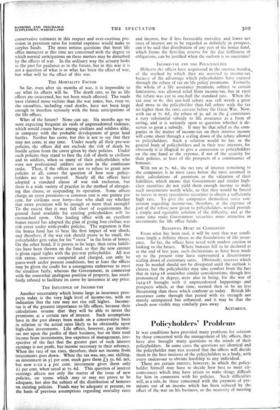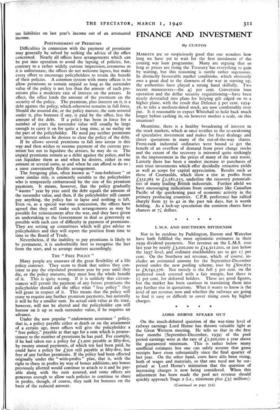Policyholders' Problems
IF war conditions have provided many problems for solution by those concerned with the management of life offices, they have also brought many questions to the minds of their policyholders. In some cases the questions are identical and the policyholder may rest assured that the offices will decide them in the best interests of the policyholders as a body, with every endeavour to obviate hardship to any individual. There are certain matters, however, in which the policy- holder himself may have to decide how best to meet cir- cumstances which may have arisen to make things difficult for him in connexion with his policies. Such difficulties will, as a rule, be those concerned with the payment of pre- miums out of an income which has been reduced by the effect of the war on his business, or the necessity of meeting tax liabilities on last year's income out of an attenuated income.
POSTPONEMENT OF PREMIUMS Difficulties in connexion with the payment of premiums may generally be solved by seeking the advice of the office concerned. Nearly all offices have arrangements which can be put into operation to avoid the lapsing of policies, for, contrary to a rather widely current impression, erroneous as it is unfortunate, the offices do not welcome lapses, but make every effort to encourage policyholders to retain the benefit of'their policies. A common system with many offices is to allow premiums to remain unpaid so long as the surrender value of the policy is not less than the amount of such pre- miums plus a moderate rate of interest on the arrears. In effect, the office lends the amount of the premium on the security of the policy. The premium, plus interest on it, is a debt against the policy, which otherwise remains in full force. Shotpld the assured die, or the policy mature, the sum assured under it, plus bonuses if any, is paid by the office, less the amount of the debt. If a policy has been in force for a nuolher of years the surrender value will usually be large enough to carry it on for quite a long time, at no outlay on the part of the policyholder. He need pay neither premiums nor interest unless he desires to clear the policy of the debt. If he allows several premiums to fall into arrear in this way. and then wishes to resume payment of the current pre- minnf but not to liquidate the arrears, he may do so. The unpaid premiums remain as a debit against the policy, and he can hquidate them as and when he desires, either in one amount or several sums, as and when he can afford to do so ; a Most conveniently flexible arrangement.
The foregoing plan, often known as " non-forfeiture " or some similar title, is eminently suitable to the policyholder who' is temporarily embarrassed by the size of his premium payments. It means, however, that the policy gradually wastes " year by year until the debt equals the amount of the surrender value, and then, if the policyholder still cannot pay anything, the policy has to lapse and nothing is left. Even FO, as a special war-time concession, the offices have agreed that they. will make such arrangements as may be possible for reinstatement after the war, and they have given an undertaking to the Government to deal as generously as possible with each case of difficulty in payment of premiums. They are setting up committees which will give advice to policyholders and they will report the position from time to time to the Board of Trade.
-Nevertheless, if the inability to pay premiums is likely to be permanent, it is undoubtedly best to recognise the fact from the start, and to arrange matters accordingly.
THE " FREE POLICY " Many people are unaware of the great flexibility of a life policy, ,contract. They seem to think that unless they con- tinue to pay the stipulated premium year by year until they die, or the policy matures, they must lose the whole benefit of it. This is quite wrong. If it is unlikely that circum- stances will permit the payment of any future premiums the policyholder should ask the office what " free policy " they will grant in respect of it. This means that the policy will cease to require any further premium payments, but naturally it will be for a smaller sum. Its actual cash value at the time, however, will not be altered and the policyholder can still borrow on it up to such surrender value, if he requires an advance.
Under the now popular " endowment assurance " policy, that is, a policy payable either at death or on the attainment of a certain age, most offices will give the policyholder a " free policy," payable at that age for a sum which is propor- tionate to the number of premiums he has paid. For example, if he had taken out a policy for Li,000 payable at fifty-five, by-twenty annual payments, of which ten had been paid, he could have a policy for £500 still payable at fifty-five, but free of any further premiums. If the policy had been effected originally under the " with-profits " plan, that is, with the right to share in profits by way of bonus additions, any bonus previously allotted would continue to attach to it and be pay- able along with the sum assured, and some offices are generous enough to allow such policies to continue to share in profits, though, of course, they rank for bonuses on the basis of the reduced amount.















































 Previous page
Previous page